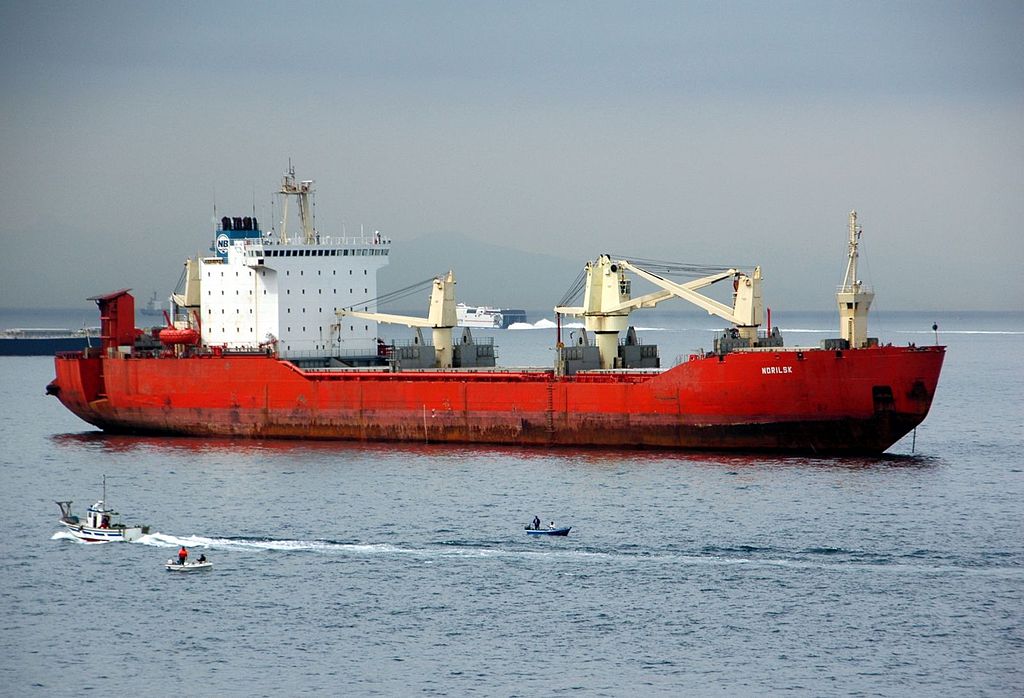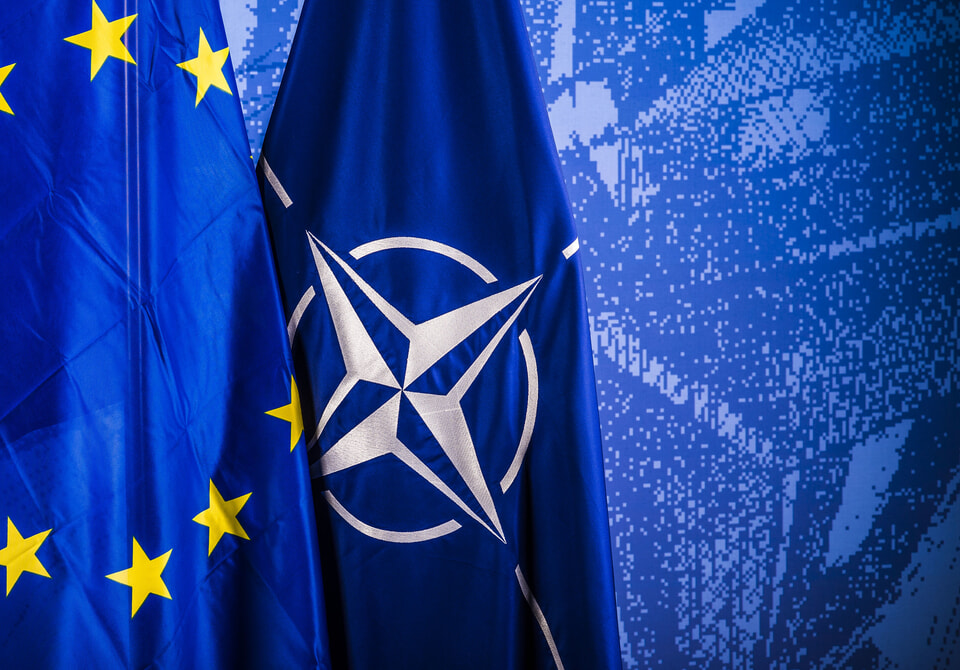Is Russia Exploiting a Gap in the Montreux Convention?
Recent reporting indicates that Russia is purportedly employing civilian merchant vessels to serve as naval auxiliaries and supply logistics to its military operations in Ukraine.

With the war in Ukraine in its fourth month, reports of slow and languishing Russian supply lines populate Western news feeds almost daily. The tyranny of distance and Russian miscalculation regarding the anticipated timeline of hostilities in Ukraine are among the various factors contributing to Russia’s muddled military effort thus far. Despite this languid start to the hostilities, it appears Russia’s military leadership is establishing a nascent wartime sea line of communication (SLOC) through the Turkish Straits and the Black Sea to ease overland logistical burdens across the Ukrainian border. Recent reporting indicates that Russia is purportedly employing civilian merchant vessels to serve as naval auxiliaries and supply logistics to its military operations in Ukraine. This activity becomes increasingly salient as Russia has diplomatically engaged Turkey in an attempt to clear additional sea lanes in Ukrainian waters for merchant traffic under the guise of bolstering grain exports.
In light of Turkey’s Feb. 28 invocation of Article 19 of the 1936 Montreux Convention, Russia’s creation of a wartime SLOC through the Turkish Straits appears antithetical to the broader intent of Turkey’s closure of the straits—which is to deescalate tensions and mitigate conflict in the Black Sea. As Mark Nevitt writes, the Montreux Convention is an “international agreement that governs the transit of all vessels (to include merchants and warships) and airplanes through the Turkish Straits, a strategic chokepoint that links the Black Sea with the Mediterranean.” Some commentators argue that Russia is violating the spirit of the convention by using merchant vessels to support military operations, but no one has yet to allege that these activities are illegal. In fact, on closer examination of the convention’s provisions, there is a colorable argument that the establishment of a Russian wartime SLOC is permitted—making these particular Russian Black Sea activities wholly appropriate within the governing legal regime.
On Feb. 28, Turkish officials in Ankara declared that a “state of war” existed between Russia and Ukraine, triggering the application of the Montreux Convention’s relevant “wartime articles.” Turkey ostensibly invoked only Article 19 of the convention, which applies “[i]n a time of war” when “Turkey is not a belligerent.” In its invocation of Article 19, Turkey explicitly declared that Russia and Ukraine were the only “belligerent” states to the armed conflict to date. Article 19 explicitly bars warships of designated belligerent states from transiting the Turkish Straits unless they are returning to their home port in the Black Sea. Nonbelligerent warships are free to transit the straits so long as they comply with the convention’s relevant peacetime articles. Those articles include provisions like aggregate tonnage restrictions and providing Turkey with a 15-day notification before transit.
However, Turkish Foreign Minister Mevlüt Çavuşoğlu’s comments in the wake of Ankara’s Article 19 invocation suggest that all states were barred from passing warships through the straits. To execute this warning, Turkey would necessarily require the authority to block the passage of nonbelligerent warships, which is granted only under Articles 20 and 21 of the convention. These articles require that Turkey either deem itself a belligerent in an ongoing war or declare that it faces the imminent danger of war. As Turkey has yet to confirm that it faces an imminent danger of war, nor has it declared it is actively engaged in hostilities, a public warning to all states only serves to muddy the strategic—and legal—waters for the international community.
NATO does not appear eager to challenge Ankara’s implementation of the convention. For example, NATO warships have not transited through the Turkish Straits since Feb. 28. Russia is obviously a belligerent in the ongoing war in Ukraine, so regardless of which article Anakra has invoked, Russia cannot transit non-Black Sea-homeported warships through the straits.
Despite the Montreux Convention’s “wartime” transit prohibition of Russian and Ukrainian warships, the convention presents a legal carve-out that Russia is evidently exploiting today. Rather than using warships or naval auxiliaries to resupply its military forces from the Black Sea, Russia is purportedly commissioning civilian merchant vessels to carry military cargo, transport weapons, and sustain forces in Ukraine with foodstuffs and fuel. The Russian government is leveraging its already close relationships with logistics companies such as Oboronlogistka and M-Leasing to shuttle these materials and provisions under the Russian flag with impunity.
The use of these private merchant vessels necessarily implicates Article 4 of the Montreux Convention, which states that “[i]n time of war, Turkey not being belligerent, merchant vessels, under any flag or with any kind of cargo, shall enjoy freedom of transit and navigation in the Straits …” (emphasis added). As mentioned above, the Turkish foreign minister’s warning that all nations should refrain from transiting the straits implies that either Turkey perceives that it faces an imminent danger of war or it is presently a belligerent in an ongoing conflict. However, short of Ankara’s explicit invocation of Article 20 or 21 of the convention, it appears Turkey is operating in the Article 19 paradigm and thus is not a belligerent in the Russia-Ukraine conflict. Under this assumption, any state—belligerent or not—enjoys unfettered transit rights of merchant vessels carrying cargo of any variety, making these Russian activities clearly legal under the convention.
The convention also features provisions for merchant vessels should Turkey affirmatively invoke either Article 20 or 21. Article 5 of the convention offers that
[i]n time of war, Turkey being belligerent, merchant vessels not belonging to a country at war with Turkey shall enjoy freedom of transit and navigation in the Straits on condition that they do not in any way assist the enemy. Such vessels shall enter the Straits by day and their transit shall be effected by the route which shall in each case be indicated by the Turkish authorities.
Similarly, Article 6, which coincides with the Article 21 “imminent danger of war” invocation, allows Turkey to establish a designated, daytime-only sea lane for merchant shipping. Notably, this article does not explicitly provide any other limitations for vessels transiting the straits. An analysis of these articles yields further evidence that Turkey, however subtly, is de facto operating in the Article 19 and Article 4 realm. The Turkish government has not declared itself a belligerent in the Russia-Ukraine war, nor has the government expressed that it feels threatened with imminent danger of war. Without a declaration of war by Ankara, there is no identified “enemy,” as required by Article 5.
Moreover, there is a dearth of precedent in implementing the Montreux Convention that would limit Russian merchant vessels from resupplying Russian forces in Ukraine. Turkey’s most recent wartime application and enforcement was during World War II. While Turkey did prevent vessels from transiting the straits, those instances are not analogous to current Russian activities. For example, the Italian-Turkish “Tarvisio” matter involved an axis effort to run supplies to forces through the Turkish Straits using a converted warship to pose as a merchant vessel carrying cargo to Eastern Europe. Though the ship was allowed to enter the straits and head into the Black Sea—over allied objections—Turkey barred its return passage, stating that “it could not accept a warship which had been changed to a merchant ship in wartime[.]”
Similarly, in 1944, Germany refitted several warships to pose as merchant vessels to transit the straits. While allied leaders complained of the “impossibility of determining the true characteristics of German ships,” the German ambassador to Turkey assured Ankara that the ships were not war vessels. Regardless, Turkey inspected the German “merchants” and halted their passage when they discovered armor, a camouflaged 30-ton derrick, and a dismantled military radar. Conversely, when Germany transited the (unaltered) merchant vessels Delchow and Larissa through the straits against allied allegations of their mission, the British Foreign Office “recognized there was no provision in the Convention interdicting their passage” and ceased all objections to their passing. In light of this historical record, Russia’s contemporary use of merchant vessels to supply resources to its military forces appears to be permissible under the Montreux Convention and immune to calls for denial of passage.
Turkey’s—and by extension the United States and its allies’—options to counter Russia’s merchant SLOC are ostensibly limited. Short of Ankara’s invocation of Article 20 or 21 of the convention, curtailing supply runs through the straits would prove delicate and complex. The international community must be sensitive to the effects of any potential responses, as they could implicate or even undermine the Montreux Convention. Separately, however, the U.S. and its allies should take note of these Russian operations. If Russia can leverage the convention’s merchant “exception” in Article 4 to create a wartime SLOC, then nonbelligerents could undertake similar actions to aid the Ukrainian defense effort without running afoul of the convention.
Disclaimer
Although the author is an active-duty officer in the United States Navy Judge Advocate General’s Corps, the opinions and assertions expressed in this article are those of the author and do not necessarily reflect the official policy or position of the United States Government, the Department of Defense, or the Department of the Navy.





